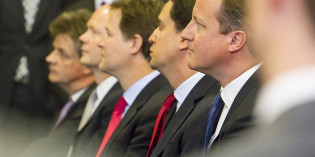Building sub-national government

The independence referendum gave plenty of reasons to be optimistic about Scotland’s democratic future
The Scottish independence referendum was the first wide-scale election in the UK to allow 16 and 17 year olds the vote, with turnout consistent with other groups. One of those first-time voters in the youngest age bracket, Duncan McEwan, thinks that the referendum gives reasons to be optimistic about Scotland’s democratic future, with the younger, largely pro-independence generation […]

The debate on the future of the British constitution must involve civil society
The referendum on Scottish independence has produced a burst of interest in constitutional issues, particularly following the Prime Minister’s espousal of ‘English Votes for English Legislation’. John Tizard argues that what follows mustn’t be an elite-led conversation, which avoids offering local government as the only solution, while including a large role for civil society. Similar […]

How to design a constitutional convention for the UK
The referendum on Scottish independence has sparked a flurry of speculation as to what reforms to the UK constitution would be most welcome and realistic. One suggestion that has been repeatedly mooted is a constitutional convention of the kind held by Canada, Iceland, and Scotland previously. Alan Renwick argues that any model applied to the UK […]

All public services are local: why we need smaller, and bigger, local government (in England)
It is well known that the UK is an over-centralised country, with Westminster and Whitehall continuing to hold the vast majority of British decision-making power. Colin Talbot argues that this state of affairs is stifling good policy-making and competent service management at all levels, with institutions like HMRC and the Prisons Service – despite being […]

The prospects for local government independence are bleak due to the centre’s unwillingness to give up power
In the wake of the Scottish independence referendum, devolution of power has become the political discussion de jour. Although most discussion has focussed on the relationship between Scotland and the rest of the UK, or on the regions, local government is still an important component of the debate. Recently, the Labour MP Graham Allen proposed legislation that […]

20 things we learned about democracy in September 2014
September 2014 was a big month for democracy, with party conferences and of course the Scottish independence referendum. Democratic Audit’s Sean Kippin rounds up 20 things that we learned about democracy this month, and talks about the referendum and conferences, but also elections in the House of Lords, human rights, and KFC chicken. Similar PostsThe […]

The English Question comprises two broad questions, with half a dozen different answers
The West Lothian Question has been back on the agenda in recent weeks following the Scottish Independence Referendum, and the promises made by the ‘No’ campaign to ensure a greater degree of self-government for Holyrood and the Prime Minister’s resultant pledge to introduce ‘English Voters for English Laws’. UCL’s Constitution Unit conducted a three-year research project […]

After Scotland’s ‘No’ vote, what next for the UK constitution?
The UK constitution does not currently conform to any particular, identifiable model. Nor would it do were the constitutional reforms currently being proposed by the Government and various other parties come to pass. For example it would not be characterisable either as a federal system or as a unitary state. Rather, the constitution would remain messy and […]

Political and constitutional turbulence in the UK looks set to continue to 2020
Scotland’s ‘No’ vote solves one acute existential threat to the UK, says Patrick Dunleavy, but only for now. The likely narrow results of the May 2015 general election, plus David Cameron’s promise of another referendum on the UK leaving the European Union in 2017, both promise massive constitutional turbulence between now and 2020. For instance, if the UK votes to leave the European Union in 2017,a near-immediate […]



 Democratic Audit's core funding is provided by the Joseph Rowntree Charitable Trust. Additional funding is provided by the London School of Economics.
Democratic Audit's core funding is provided by the Joseph Rowntree Charitable Trust. Additional funding is provided by the London School of Economics.